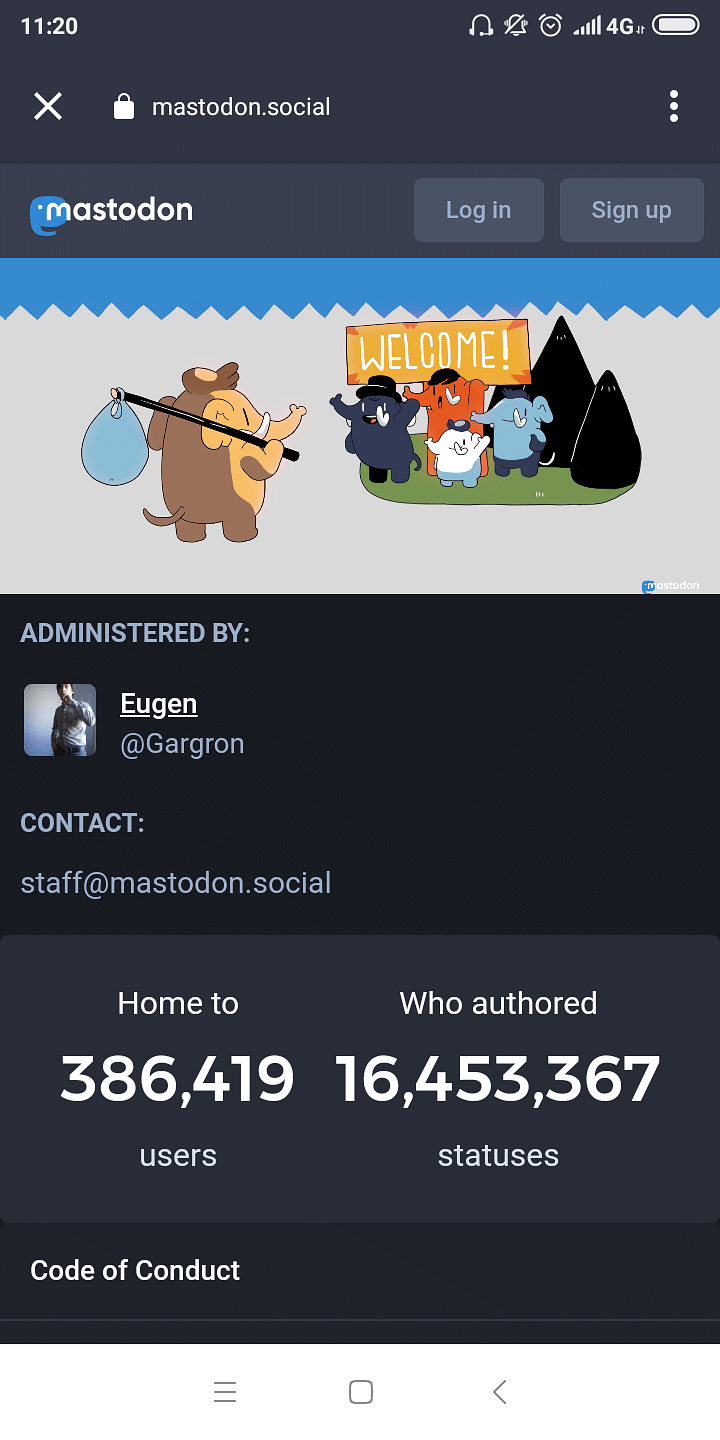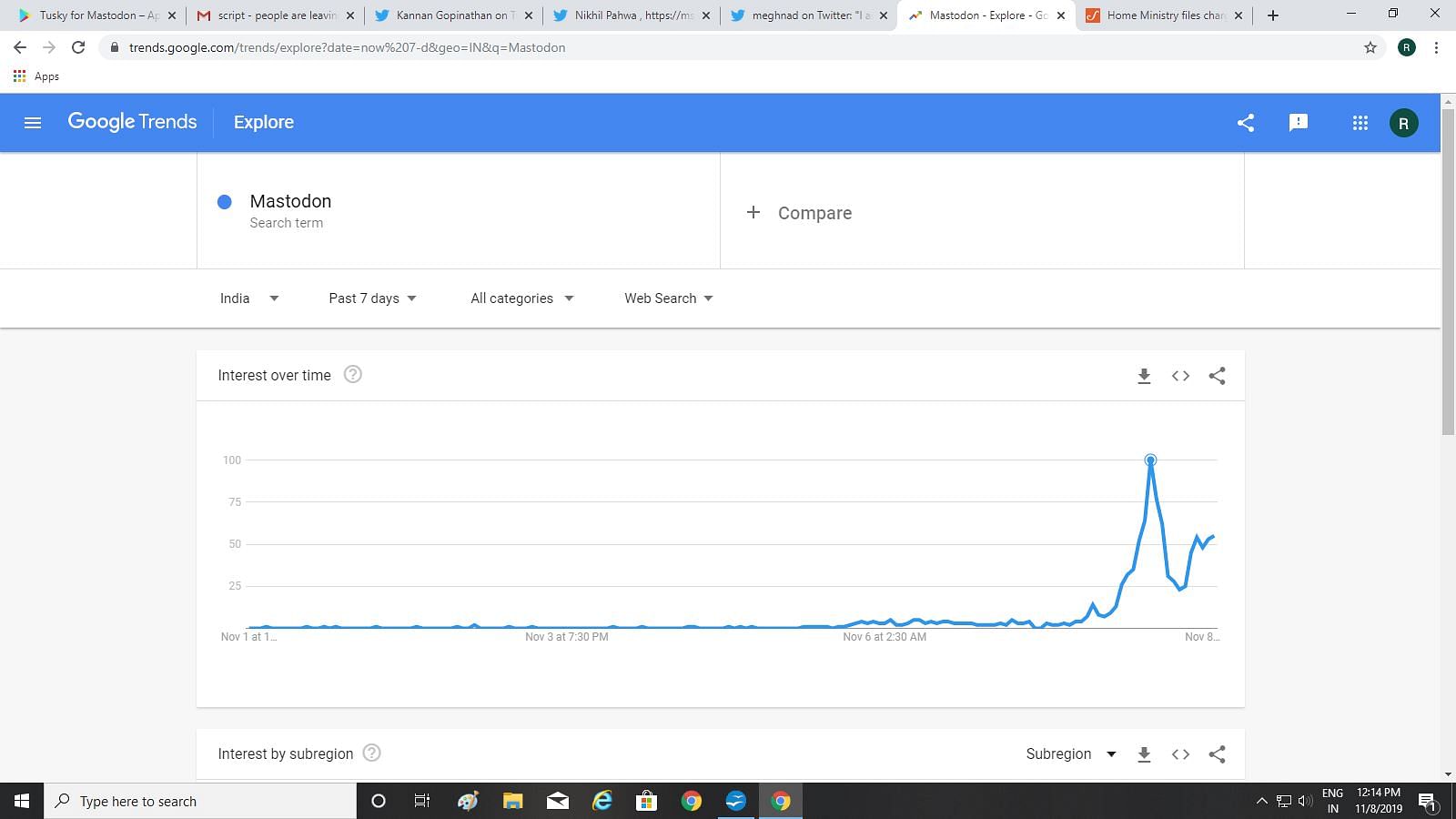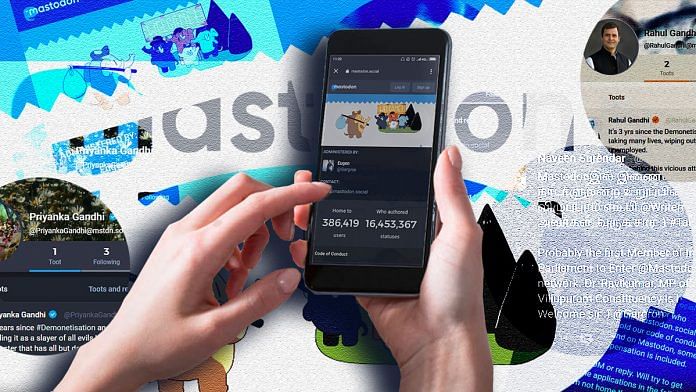New Delhi: A large number of Indian Twitter users are signing up on a rival social media platform called Mastodon in solidarity with the “illegal suspension” of Supreme Court lawyer Sanjay Hegde’s account over a couple of posts.
Hegde’s account was first suspended on 26 October over his cover photo, which featured the iconic Hitler-era image of a lone man with his arms crossed in a crowd of people performing the Nazi salute. The image is considered one of the most poignant depictions of defiance against totalitarianism.
On 27 October, Hegde’s account was suspended once again over a 2017 post where he retweeted the poem ‘Usko Phaansi Do (Hang Him)’ by Gorakh Pandey, originally posted by activist Kavita Krishnan. Users had mass-reported these tweets to Twitter.
Soon after the suspension, Hedge had said that he would henceforth be using Mastadon, considered a “Twitter without Nazis“. Subsequently, many India Twitter users, including activists and a former IAS officer, began exploring Mastodon.
So much so that its founder, 26-year-old Eugen Rochko, even put up a post early Friday, saying the platform was looking for Hindi and Tamil moderators.
Internet and online privacy activists like Nikhil Pahwa, and IAS officer Kannan Gopinathan, who quit the service in protest against the Jammu & Kashmir shutdown, are among hundreds of Indian users who have joined Mastodon.
nixxin@mstdn.social is where I am.
Any app reccos for Mastodon? https://t.co/Vu4iQtJ4wa
— Nikhil Pahwa (@nixxin) November 6, 2019
Back on twitter after an enjoyable 24 hours on mastodon. Will be slowly moving to mastodon. I am at naukarshah@mastodon.social & naukarshah@mstdn.social.
Unlike centralised twitter that can ban you as per their wish this is a federated structure. With multiple social instances. https://t.co/8RvQx6IKhQ
— Kannan Gopinathan (@naukarshah) November 7, 2019
But what exactly is this platform and how is it different from Twitter?
Also read: Twitter emerges as a top threat to democracy in India and across the world
What is Mastodon
Founded in 2016, Mastodon is similar to Twitter in the sense that one can make a profile, post content (called toots) — including videos — and follow others. The name Mastodon refers to one of the “several extinct elephantine mammals“, which looks similar to the endearing cartoon elephant logo the social network has adopted.

But unlike Twitter, Mastodon is a decentralised platform. While sites such as Twitter or Facebook are controlled by one company, Mastodon isn’t operated by one person alone.
The easiest way to get Mastodon on an android phone is to download an app called Tusky while iOS users can get it via another application, Toot!
There are over a million registered Mastodon users globally, Mastodon says in a video posted on the website. The clip also explains that the platform is mostly crowdfunded and does not seek profits. This will limit ads and data-sharing with companies in exchange for revenue.
“Unlike traditional social media, Mastodon can’t go bankrupt [because it’s crowdfunded], it can’t be sold, and it can’t be completely blocked by governments,” the video adds.
Another difference between Mastodon and traditional social networking sites is that the former is made up of several sites (called ‘instances’) that can communicate with each other. In addition to setting up a general profile to follow another person, a user can also set up her or his own ‘instance’ on Mastodon. This is possible because Mastodon is made using open-source software that is publicly available.
All these ‘instances’ together form the Mastodon social network.
Being decentralised, however, also means that even its founder cannot block users promoting hate speech. For example, an ‘instance’ called Gab that supports racist content cannot be fully blocked or banished from using Mastodon. The best Mastodon developers can do is isolate Gab from all other ‘instances’ on the platform.
As more and more Indians signed up, Mastodon’s popularity hit a new peak on Google Trends around 12.30 am on 8 November. It was also trending on Twitter.

While it is too early to say if Mastodon will become a mainstay in India, Rahul Sharma, founder of The Perspective, a think tank advising on cyber policy, said, “Too early to comment on wide and regular adoption of Mastodon as [a] Twitter alternative, but if influencers minimise their Twitter activities and continue to promote and use Mastodon, its viability as a competition strengthens.”
He also said that Mastodon is an alternative to Twitter in India, primarily journalists, activists and lawyers who have called out the micro-blogging site’s alleged inaction “against hate speech, bias and arbitrary application of its own rules is signalling a changing trend – a backlash against big technology monopolies”.
After the outrage against Twitter’s “prejudice”, Mastodon has gained so much popularity that fake accounts have already begun to come up. Former Congress chief Rahul Gandhi and the party’s general secretary Priyanka Gandhi Vadra are some of the prominent personalities whose fake accounts have been created.
However, barely hours after Rahul’s fake account posted a ‘toot’, the party clarified that the accounts were ‘not authentic.’
This is to clarify that the accounts of Shri @RahulGandhi, Smt. @priyankagandhi or that of INC India on Social Media platform, Mastodon are not authentic.
— Congress (@INCIndia) November 8, 2019
Also read: Twitter won’t restore Sanjay Hegde’s account, lawyer says will move court



